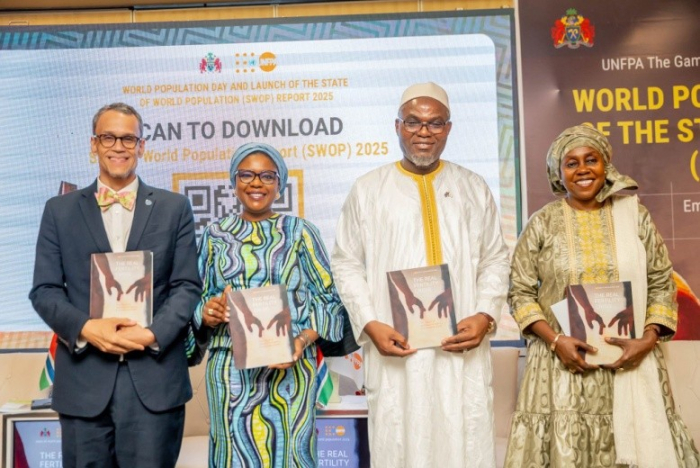
This year’s national commemoration was presided over by the Vice President of the Republic of The Gambia, H.E. Muhammad B.S. Jallow, who delivered the keynote address on behalf of President Adama Barrow. The event was organised by the National Population Commission Secretariat (NPCS) in collaboration with UNFPA.
In his remarks, Vice President Jallow described the dual event as a significant opportunity to reflect on the human dimensions of population change, particularly on the issues of reproductive rights, personal agency, and informed choice. He commended UNFPA for its leadership in advocating for the empowerment of women and young people across the globe and reaffirmed the government’s commitment to advancing sexual and reproductive health and rights in The Gambia.
Speaking on the report’s theme, Vice President Jallow emphasised the urgent need to move away from long-standing global fears of overpopulation and declining birth rates. He said the real population challenge lies in the millions of people who are unable to meet their reproductive goals due to limited access to information, services, and decision-making power.
Titled: “The Real Fertility Crisis: The Pursuit of Reproductive Agency in a Changing World,” the 2025 report shifts the focus of population discussions to the concept of reproductive agency – the ability of individuals to decide freely and responsibly whether, when, and with whom to have children, and to access the resources needed to exercise those choices.
Highlighting national demographics, Vice President Jallow noted that according to the 2024 Population and Housing Census, The Gambia’s population stands at 2.4 million, with 77 percent under the age of 35. He pointed to the country’s demographic shift as a potential catalyst for economic growth, provided investments are made in youth development, education, and reproductive health.
He however warned that such opportunities would not materialise without addressing persistent inequalities in access to reproductive health services, especially for girls and women in rural areas. He cited the modern contraceptive prevalence rate at only 17 percent and an unmet need for family planning exceeding 24 percent. He also highlighted that maternal mortality remains a pressing concern at 289 deaths per 100,000 live births, with 14 percent of adolescent girls beginning childbearing between ages 15 and 19.
Delivering a statement on behalf of UNFPA, Country Representative Ndeye Rose Sarr said the global population debate should no longer be about numbers but about the realities of young people whose reproductive choices are constrained by economic insecurity, limited health services, gender inequality, and social barriers.
She described The Gambia’s youthful population as both a tremendous asset and a challenge, urging policymakers to listen to the aspirations of young people who wish to build healthy families, pursue education, and contribute meaningfully to national development.
Sarr called on government institutions, development partners, civil society organisations, and communities to renew their commitment to creating an environment where every young Gambian can make reproductive choices with dignity and confidence. She noted that the signing of a new Compact of Commitment between UNFPA and the Government of The Gambia to co-finance reproductive health services is a step in the right direction, but more needs to be done to sustain and expand such initiatives.
Quoting a young activist featured in the report, Sarr stressed the importance of preparing a future that supports the dreams of today’s youth, saying: “It is not only about our future children, but the world those children will inherit.”
World Population Day was first established by the United Nations in 1989 to draw attention to population issues and their link to sustainable development. This year’s observance in The Gambia reaffirmed the country’s commitment to advancing human rights, gender equality, and the empowerment of young people as drivers of national progress.





